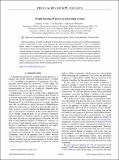Fragile topological phases in interacting systems
Author(s)
Else, Dominic V.; Po, Hoi Chun; Watanabe, Haruki
DownloadPhysRevB.99.125122.pdf (603.7Kb)
Terms of use
Metadata
Show full item recordAbstract
Topological phases of matter are defined by their nontrivial patterns of ground-state quantum entanglement, which is irremovable so long as the excitation gap and the protecting symmetries, if any, are maintained. Recent studies on noninteracting electrons in crystals have unveiled a peculiar variety of topological phases, which harbor nontrivial entanglement that can be dissolved simply by the the addition of entanglement-free, but charged, degrees of freedom. Such topological phases have a weaker sense of robustness than their conventional counterparts, and are therefore dubbed “fragile topological phases.” In this work, we show that fragile topology is a general concept prevailing beyond systems of noninteracting electrons. Fragile topological phases can generally occur when a system has a U(1) charge conservation symmetry, such that only particles with one sign of the charge are physically allowed (e.g., electrons but not positrons). We demonstrate that fragile topological phases exist in interacting systems of both fermions and of bosons.
Date issued
2019-03Department
Massachusetts Institute of Technology. Department of PhysicsJournal
Physical Review B
Publisher
American Physical Society (APS)
Citation
Else, Dominic V. et al. "Fragile topological phases in interacting systems." Physical Review B 99, 12 (March 2019): 125122 © 2019 American Physical Society
Version: Final published version
ISSN
2469-9950
2469-9969